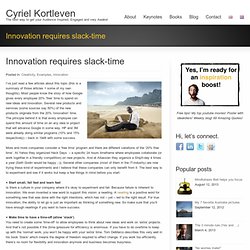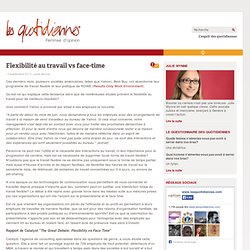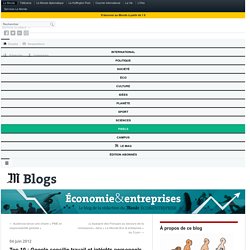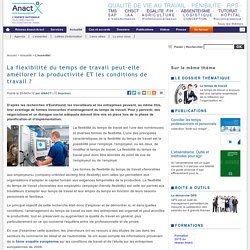

Atkinson théorie de l'entreprise flexible livres. Groupe de travail GRH - b00395068 - Messagerie ESSEC. Chapitre_6(2) Should Your Business Offer Google’s “20% Time”? The very thought of giving employees paid time to work on anything they want – or even nothing at all – is enough to make most business owners cringe.

But should it? This phenomenon, which is sweeping across corporate America, stems from Google’s pioneering program known as “20% Time.” The 20% refers to the portion of work hours in which employees at Google can work on anything they’d like (and yes, there are some exceptions). And though it sounds far-fetched, be aware that Google has publicly stated that some of its best inventions come from the advances made by employees during their 20% time. But how did such a unique policy get started? Gaining a Foothold on the Market Originally launched as yet another web directory, Google has single-handedly revolutionized the way we search the internet. Throughout this process, Google was transformed from a small company started by two Stanford students to an internet wide game changer. Innovation requires slack-time - Cyriel Kortleven. I’ve just read a few articles about this topic (this is a summary of those articles + some of my own thoughts).

Most people know the story of how Google gives every employee 20% ‘free’ time to spend on new ideas and innovation. Several new products and services (some sources say 50%) of the new products originate from the 20% ‘innovation’ time. The principle behind it is that every employee can spend this amount of time on an any idea or project that will advance Google in some way. HP and 3M were already doing similar programs (10% and 15% respectively) – back in 1948 with some success. More and more companies consider a ‘free time’ program and there are different variations of the ’20% free time’ . + Start small, fail fast and learn fast Is there a culture in your company where it’s okay to experiment and fail. Shannon Deegan: How Google's 20 Percent Time Fosters Innovation. Google Says 20% Time Is Still Core Part Of Company Culture. As it turns out, rumors of the demise of Google’s 20-percent time have been greatly exaggerated.

A Google spokesperson confirmed today that employees are still encouraged to pursue ideas that might fall outside of their normal work scope, or what has commonly been referred to as Google’s “20% time.” A story earlier today from Quartz.com claimed Google’s 20-percent time was “as good as dead.” The report sparked a debate on Hacker News, and has now resulted in a follow-up article with comments from anonymous Googlers alleging Quartz.com’s earlier report was “flat-out” wrong. “As a Googler, I can confirm that this article is… completely wrong,” said one anonymous commenter on Hacker News, “I don’t have to get approval to take 20% time, and I work with a number of people on their 20% projects.” A Google spokesperson told Marketing Land that the company recognizes people are more productive when they are working on projects that excite them. Flexibilité au travail vs face-time.
Ces derniers mois, plusieurs sociétés américaines, telles que Yahoo!

, Best Buy, ont abandonné leur programme de travail flexible et leur politique de ROWE (Results-Only Work Environment). Qu'est-ce qui explique cette tendance alors que de nombreuses études prônent la flexibilité au travail pour de meilleurs résultats? Voici comment Yahoo a annoncé par email à ses employés la nouvelle: "A partir du début du mois de juin, nous demandons à tous les employés avec des arrangements de travail à la maison de venir travailleur au bureau de Yahoo. Si cela vous concerne, votre management s'est déjà mis en contact avec vous pour traiter des prochaines démarches à effectuer. Personne ne peut nier l'utilité et la nécessité des interactions au travail, ni leur importance pour la progression de carrière, mais est-ce nécessaire de supprimer toute forme de travail flexible? Le_Nouveau_Travail_-_un_Travail_Different. Top 10 : Google concilie travail et intérêts personnels.
Exit l’emploi du temps rigide.

De plus en plus de jeunes diplômés plébiscitent en effet les entreprises où ils peuvent jongler entre leur travail et leur vie privée sans que cela soit mal vu. Google, Ubisoft, Canal + et Electronic Arts les font rêver. C’est ce qui ressort du Top 10 sur le critère de la « possibilité d’intégrer mes intérêts personnels dans mon emploi du temps ». La flexibilité du temps de travail peut-elle améliorer la productivité ET les conditions de travail ? Publié le 20-NOV-12 par ANACT | Imprimer D’après les recherches d’Eurofound, les travailleurs et les entreprises peuvent, au même titre, tirer avantage de formes innovantes d’aménagement du temps de travail.

Pour y parvenir, des négociations et un dialogue social adéquats doivent être mis en place lors de la phase de planification et d’implémentation.